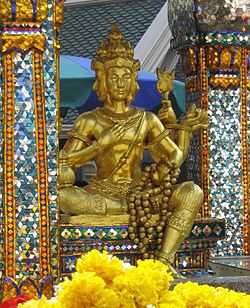Phra Phrom
Phra Phrom (พระพรหม; from Sanskrit: Vara Brahma) is the Thai representation of the Hindu god Brahma,[1] who is regarded in Thai culture as a deity of good fortune and protection.
Worshipers of Phra Phrom usually offer incense, candles, jasmine flowers or jasmine garlands and young coconut milk (with water in them) in their worship, usually placing these offerings before all four heads of Phra Phrom, each head representing a different aspect of the deity; it is believed each side of Phra Phrom offers different blessings. Another common way of worship is to place wooden elephant statues on the altar to honor him. Phra Phrom is also known to admire Thai classical music, which is played near larger scale outdoor altars, accompanied by dancers. Worshipers of Phra Phrom are also usually advised to abstain from consuming meat. It is also believed that worshipers have to make good on any promises made to the deity else misfortune will befall them instead of the fortune that was asked for.
Phra Phrom is colloquially known outside Thailand as the four-faced Buddha (四面佛, Sìmiàn fó) by overseas Chinese worshipers, especially in Hong Kong, Macau and Taiwan where worship of Phra Phrom is popular.
A celebrated example of this representation of Brahma is the statue at the Erawan Shrine in Bangkok.[2] The golden dome of the Government House of Thailand also contains a statue of Phra Phrom.
Gallery
|
See also
- Brahma
- Erawan Shrine
- Greater India
- Brahma (Buddhism)

